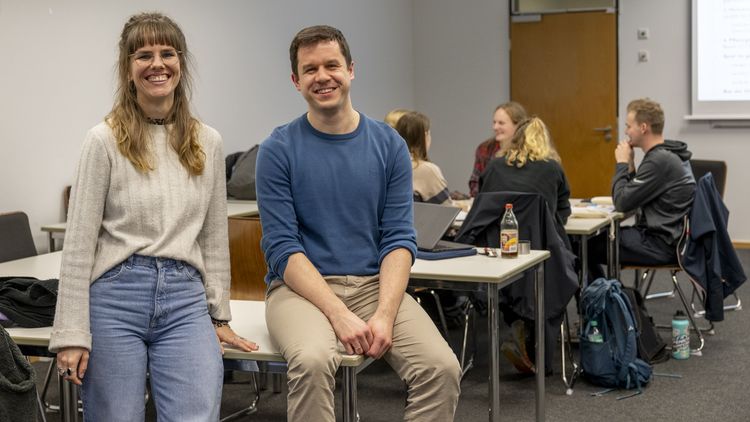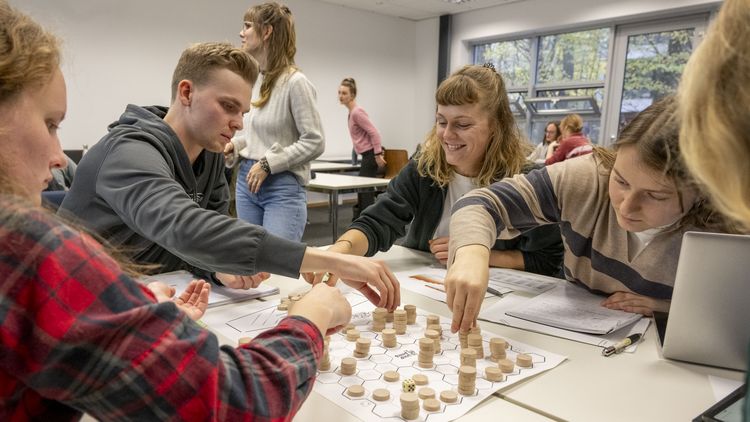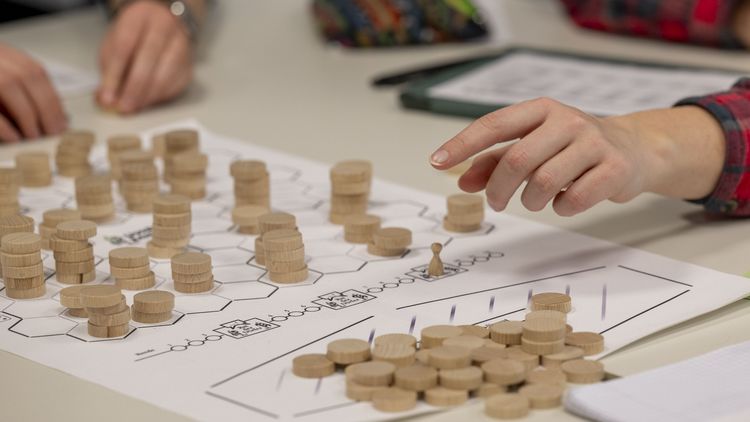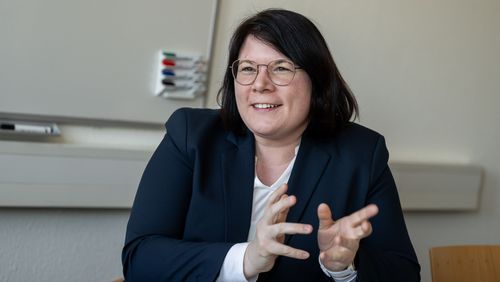When the dice roll in Sophie Berg and Hendrik Wolter's seminar, it' less about fun and games and more about becoming more aware of the conflicting goals of sustainable management – and one's own ambivalence.
Stephanie Pope throws the dice and five pairs of eyes follow it, mesmerised, as it rolls across the table. "Yes!" everyone cheers, when it lands on six, because six means that all the "trees" on the playing field at the centre of the table get to grow by three levels. This unexpected growth spurt is crucial, because in the next phase of the game some of the trees will be cut down and divided up among the players. Pope, Malte Albrecht and their fellow students Viktoria Hamburg, Svea Kuhlmann and Sophia Kruse are playing Woodbanks, a board game that revolves around the collaborative management of a fictional forest.
The game is part of the curriculum for the seminar “Decision Making Under Uncertainty: Making the Dilemmas of Sustainability Tangible Through Play” taught by Sophie Berg and Dr Hendrik Wolter and aimed at students from various Master's programmes in the fields of economics and the social sciences. "It takes perseverance and resilience to tackle major challenges such as climate change, social inequalities and other sustainability issues successfully," says Berg. "We often face dilemmas, in other words conflicting goals, when we try to solve these problems," she adds. She cites the "plate or tank" debate as an example – the question of whether plants should be used only as food or also as biofuel. "The main goal of the seminar is to reflect on how difficult it can be to act sustainably," says Wolter. Game-based learning offers a safe experimental space for discussions, because students can grapple with dilemma situations in an intuitive way in which mistakes have no real consequences. Wolter says the games not only sensitise students to conflicts of values and interests, but also to emotions such as greed, anger, shame and peer pressure. "We refer to this as 'serious gaming'. It's all about gaining an understanding of different perspectives and other people's behaviour," Sophie Berg adds.
Woodbanks offers ample potential for conflicting goals
The Woodbanks game offers a good opportunity to do this, Berg says. Each player takes charge of a village that competes with all the other villages for a limited number of trees "growing" at the centre of the game board. How quickly the trees grow depends on the roll of a dice – in other words, chance. After the growth phase, the players take turns to decide how many trees they want to cut down for their village and how much of their harvest they want to invest in planting new trees. The first three trees each cost a "tree chip" which forms the basis of a new tree. Additional trees are more expensive. The crux: the winner is the player who has harvested the most timber by the end of the game – but only if they are able to pay the taxes due to the community treasury throughout, and there are more than five trees left on the board at the end of the game. If one of these two conditions is not met, everyone loses. To avoid this scenario, the players frequently convene at a "Council of Villages" over the course of the game to try to establish sensible rules on managing the limited resources. Woodbanks therefore offers ample potential for conflicting goals and requires players to constantly weigh common interests against individual ones and solidarity against selfish behaviour. "The game shows very clearly how difficult it can be to act sustainably," explains Wolter.
The seminar's participants experience this first hand. When student Malte Albrecht cuts down far more trees than the other players in one round, co-player Viktoria Hamburg is quick to rebuke him: "The forest has to stay alive, it's not about one village chief getting one up on the others!". Albrecht justifies his move: "I need enough tree chips to plant and to give away and still have some left over for myself." A few rounds later, when a spate of unlucky dice rolls results in low forest growth, a sense of despair takes hold in the group. "I don't think anyone here can get rich, we just need to survive somehow," says Stephanie Pope in a worried tone. A round of intense negotiations in the Council of Villages ensues, to determine which village should plant how many trees to avoid the game ending prematurely. Malte Albrecht, who has just been reprimanded for his greed, decides to skip a round of felling. "Exemplary," his co-players comment. "You can't win all on your own," points out Sophia Kruse, reiterating the principle of the game.
The reality is even more complicated
In the end, Malte still wins the game. "Our team would have had to be greedier to win," says Viktoria. In the reflection round that follows, the participants agree that as well as being fun the game was quite complicated – in particular when it came to finding the right balance between self-interest and solidarity with others. "After all, environmental influences and natural disasters barely figure in the game. That would make it even more difficult," reflects Svea Kuhlmann. For the students, the game was a taste of the dilemmas they may face in their future careers: how to balance social, economic and environmental interests? Who gets what proportion of the shared resources? How much can you rely on fair play, and where are binding and codified rules needed? In the reflection sessions after the games, the students analyse their own emotional and normative attitudes in tense situations in order to learn how to better deal with such situations as well as to promote decision-making and organisational competences. Because as everyone involved knows, the reality is far more complicated.






